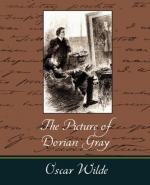After some time they left the clay road and rattled again over rough-paven streets. Most of the windows were dark, but now and then fantastic shadows were silhouetted against some lamplit blind. He watched them curiously. They moved like monstrous marionettes and made gestures like live things. He hated them. A dull rage was in his heart. As they turned a corner, a woman yelled something at them from an open door, and two men ran after the hansom for about a hundred yards. The driver beat at them with his whip.
It is said that passion makes one think in a circle. Certainly with hideous iteration the bitten lips of Dorian Gray shaped and reshaped those subtle words that dealt with soul and sense, till he had found in them the full expression, as it were, of his mood, and justified, by intellectual approval, passions that without such justification would still have dominated his temper. From cell to cell of his brain crept the one thought; and the wild desire to live, most terrible of all man’s appetites, quickened into force each trembling nerve and fibre. Ugliness that had once been hateful to him because it made things real, became dear to him now for that very reason. Ugliness was the one reality. The coarse brawl, the loathsome den, the crude violence of disordered life, the very vileness of thief and outcast, were more vivid, in their intense actuality of impression, than all the gracious shapes of art, the dreamy shadows of song. They were what he needed for forgetfulness. In three days he would be free.
Suddenly the man drew up with a jerk at the top of a dark lane. Over the low roofs and jagged chimney-stacks of the houses rose the black masts of ships. Wreaths of white mist clung like ghostly sails to the yards.
“Somewhere about here, sir, ain’t it?” he asked huskily through the trap.
Dorian started and peered round. “This will do,” he answered, and having got out hastily and given the driver the extra fare he had promised him, he walked quickly in the direction of the quay. Here and there a lantern gleamed at the stern of some huge merchantman. The light shook and splintered in the puddles. A red glare came from an outward-bound steamer that was coaling. The slimy pavement looked like a wet mackintosh.
He hurried on towards the left, glancing back now and then to see if he was being followed. In about seven or eight minutes he reached a small shabby house that was wedged in between two gaunt factories. In one of the top-windows stood a lamp. He stopped and gave a peculiar knock.




